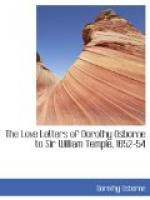“My good sister,
“Your faithful brother and servant,
“THOMAS PEYTON.
“KNOWLTON, Sept. 22, 1653.”
On the other side of Sir T. Peyton’s Letter.
Nothing that is paper can ’scape me when I have time to write, and ’tis to you. But that I am not willing to excite your envy, I would tell you how many letters I have despatched since I ended yours; and if I could show them you ’twould be a certain cure for it, for they are all very short ones, and most of them merely compliments, which I am sure you care not for.
I had forgot in my other to tell you what Jane requires for the satisfaction of what you confess you owe her. You must promise her to be merry, and not to take cold when you are at the tennis court, for there she hears you are found.
Because you mention my Lord Broghill and his wit, I have sent you some of his verses. My brother urged them against me one day in a dispute, where he would needs make me confess that no passion could be long lived, and that such as were most in love forgot that ever they had been so within a twelvemonth after they were married; and, in earnest, the want of examples to bring for the contrary puzzled me a little, so that I was fain to bring out those pitiful verses of my Lord Biron to his wife, which was so poor an argument that I was e’en ashamed on’t myself, and he quickly laughed me out of countenance with saying they were just such as a married man’s flame would produce and a wife inspire. I send you a love letter, too; which, simple as you see, it was sent me in very good earnest, and by a person of quality, as I was told. If you read it when you go to bed, ’twill certainly make your sleep approved.
I am yours.
Letter 36.—My Lady Carlisle was, as Dorothy says, “an extraordinary person.” She was the daughter of Henry Percy, Earl of Northumberland, and at the age of eighteen, against her father’s will and under somewhat romantic circumstances, married James Hay, Earl of Carlisle. Her sister married the Earl of Leicester, and she is therefore aunt to Lady Sunderland and Algernon Sydney. She was a favourite attendant of Queen Henrietta, and there are evil rumours connecting her name with that of Strafford. On Strafford’s death, it is asserted that she transferred her affections to Pym, to whom she is said to have betrayed the secrets of the Court. There seems little doubt that it was she who gave notice




